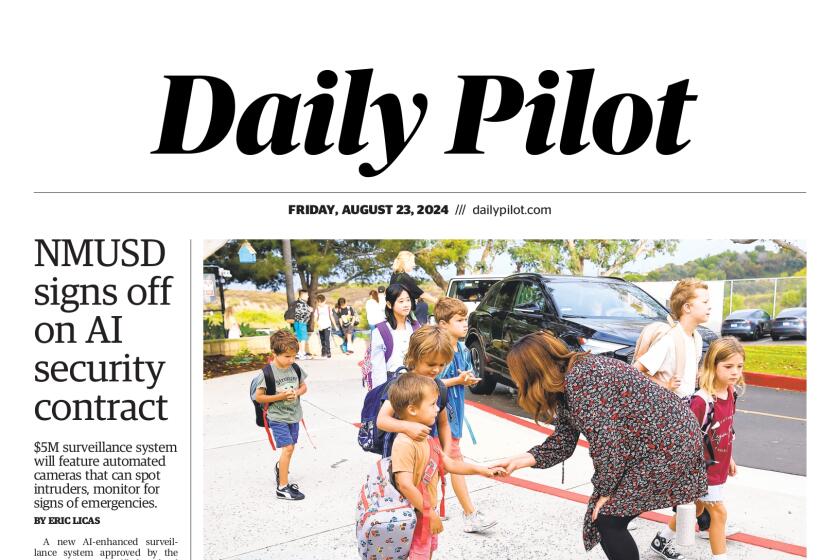As measures fail, plans sought
With five of six special ballot measures decidedly defeated Tuesday night, city and school leaders are bracing for deep cuts while local state lawmakers gird themselves for another turn at the budget.
Assemblymen Van Tran and Chuck DeVore and Sen. Tom Harman agreed that voters sent a powerful message to Sacramento to start cutting the budget, something the trio of Republicans have championed throughout the state’s financial crisis. DeVore and Harman said they were willing to consider Gov. Arnold Schwarzenegger’s proposed sale of the Orange County fairgrounds if it made sense and could preserve the fair, while Tran tilted strongly against it.
Meanwhile, Newport Beach and Costa Mesa are staring down $5.8 million and $3.4 million in cuts from their city budgets, respectively, if the state borrows money from local governments as Schwarzenegger said it would do if voters rejected the propositions.
Newport Beach Mayor Ed Selich said the city should first look to its reserves to cover the money the state takes because the state is required to pay it back in a few years. Cutting that much money from the city’s budget now would likely be noticed by residents, he said.
“In the short term, the failure will probably have a negative impact on the city because it’s pretty apparent that the state will come and raid the city’s coffers, but maybe in the long-term it will help because the state will have to sit down and get its act together,” Selich said.
Costa Mesa has much less money in its reserve than Newport. Mayor Allan Mansoor wanted the propositions to fail, saying that they were irresponsible, but he thinks the state should make up the lost revenue by cutting spending more instead of borrowing from local government.
“They have not even begun to make anything that comes close to reasonable cuts,” Mansoor said. “They can make cuts; they shouldn’t take it from the cities.”
The Newport-Mesa Unified School District hasn’t had to lay off any teachers or jettison major programs, but if billions more in state funding are taken away by the state the district will have to make more noticeable cuts, said School Board President Dana Black.
“We’re not getting any clear-cut information. We have to wait and see because we don’t know what [the state will take],” Black said.
The district is working on a contingency plan for dealing with losing more money, but no specific plan has been passed by the board yet.
“The people tonight have spoken clearly, and we affirm the need for California to make structural, fundamental reforms on how the state runs its own government,” Tran said.
Tran’s not sure what those reforms might be.
“A lot of dynamics will come into play. One thing is for sure, it won’t be business as usual,” he said.
He brushed off the notion that Democrats in Sacramento will move to cut Republicans out of the budget process by making it possible to approve a budget with a simple majority.
Republicans, although in the minority, have clout because the budget can’t be approved without a two-thirds majority voting yes.
DeVore, though, envisions that doomsday scenario for the GOP. DeVore predicts Democratic state lawmakers will initially move to “punish” voters with draconian cuts in public service.
“You’ll see massive cuts in programs voters care about such as education, health care to the aged and indigent,” he said. “They’ll say, ‘Look, you had this temper tantrum and voted against all these extra billions to play with so we’ll punish you and the Republicans rather than reform government and live within our means.’”
But union leaders “will pull them from the brink” and nudge the Democrats to require just a simple majority for budget approval. This will have a 50-50 chance of surviving a legal challenge, DeVore said.
Harman thinks lawmakers will go back to work considering where they can cut government. He’s not sure what will get trimmed and felt it was too premature to speculate.
“We’re simply going to have to go back to and take a look at what the state’s income is, where the expenses are coming from and balance them. It’s as simple as that,” Harman said. “You can’t spend more than what you have. That’s what Mom and Dad do. They sit down around the kitchen table during a recession and say, ‘We’ll just have to live within our means.’ We haven’t been doing that.”
BY THE NUMBERS
Election results statewide, as of 11:30 p.m. Tuesday.
Prop 1A: 35.4%, yes; 64.6%, no
Prop 1B: 38.8%, yes; 61.2%, no
Prop 1C: 36.7%, yes; 63.3%, no
Prop 1D: 35.7%, yes; 64.3%, no
Prop 1E: 35.1%, yes; 64.9%, no
Prop 1F: 75.2%, yes; 24.8%, no
VOICES
Here’s what some voters were saying as they cast their ballots Tuesday:
“Basically what I’ve seen here is more ‘no’ than ‘yes’ by what I could see from the others’ votes. I think the ‘no’ votes will win because basically people vote how they need. If the ‘yes’ passes, the state will have a bigger deficit.
“I voted all ‘no,’ not even one ‘yes.’”
— Walter Langlinais
“Spending is unnecessary.”
— Donna Barnhard
I think it’s creating a greater problem. Parts of them I believe are good, but as a whole they are not. They weren’t written properly.”
— Jenny Johnson
“I’m voting all no’s.”
— Brooke Walker
“Let’s kind of try to balance this budget. Here’s hoping they will decrease the deficit. Some things we’ll have to deal with right now, but in the longer term it’s going to be worth it.”
“Whatever the Republicans are for, I’m against. I’m a strict Democrat. Have always been. And since the Republicans are against the propositions, I’m for them.”
— John O’Donnell
— Compiled by Michelle Mocarski
All the latest on Orange County from Orange County.
Get our free TimesOC newsletter.
You may occasionally receive promotional content from the Daily Pilot.



